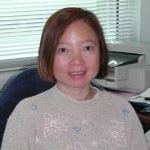In her studies of the boundary between the bulk properties of matter and the quantized world of atoms and molecules, Dr. Cheng has an almost unquenchable demand for CPU cycles. The molecular dynamics simulations carried out by her group require the simultaneous use of dozens to hundreds of processors if they are to complete in a reasonable period of time (hours or days rather than weeks or months). Although she has access to some of the worlds most powerful computers, she needs local resources as well.
To meet these needs Dr. Cheng chose to invest in the HPC Center and has contributed to both the Phase IIB and Phase III clusters. By doing so, she has given her group access to hundreds of processors and terabytes of storage with fewer restrictions and more responsive support than she can get from the national supercomputer centers. On several occasions when her students were having trouble completing large calculations she sent them to the HPC Center staff for help. The HPC Center staff then worked with them to isolate the problem and rebuild the applications with an alternate MPI implementation. They further went on to help determine the best (most efficient) set of parameters for the calculations which were promptly finished. Additionally, one of Dr. Cheng’s students won the 2009 Metropolis Award with work done in part on the HPC Center facilities.
Her investment in the HPC Center also frees her from having to worry about things that have little to do with her science. Issues such as hardware maintenance, Linux distributions, compiler versions, and MPI implementations are taken care of by the HPC Center staff while she and her group do what they do best – develop insight into structure and behavior on nano-scale materials through computational modeling.

